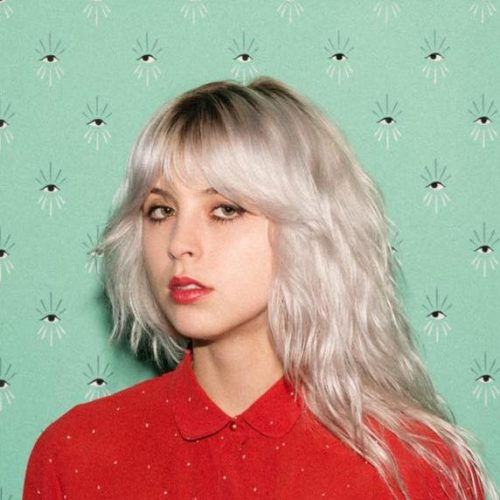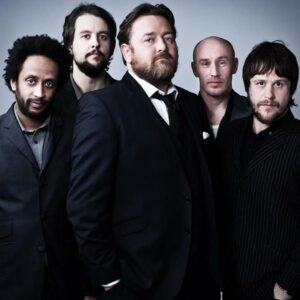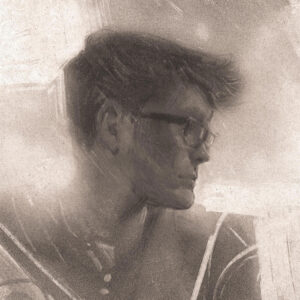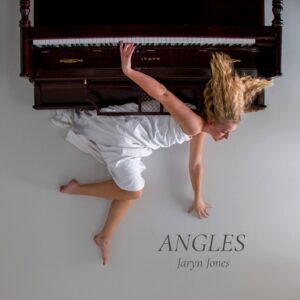Listening to Mikaela Davis is like watching a firework.
The classically trained musician blends her musical expertise with her passion for pop, and out of it all erupts the spectacle that is Delivery, her latest album.
The rich color comes from Mikaela’s honest voice as both singer and songwriter. Her band booms alongside her, bringing back the energy of the 70s and 80s music scene to the modern genre. And what glitters throughout the entire work is her trusty harp, (for which she has a degree in performance) adding a special, whimsical atmosphere to the work.
There’s a difference between finding new music you haven’t heard before and new music that just hasn’t been written yet. Delivery is just that—a fresh take on psychedelic pop from a young voice with a lot of experience behind it, both personal and musical. Mikaela, who opens up about relationships, self-doubt, and self-acceptance, has opened for Bon Iver, The Staves, and Lake Street Dive.
From taking risks by writing on different instruments, to working with a professional producer for the first time, to removing her old music from her digital platforms, the story of how Delivery was made is just as interesting as the album itself.
So go check out Mikaela’s new music for yourself and read all about how it came to be below.
What got you into playing music?
Mikaela: I went to a public school, and the music program there was really good. There were two different orchestras. Once you got to high school, you had to audition to be in the more serious orchestra, and there were two different bands. You could start a string instrument in third grade, and they showed us violin, viola, cello, bass. And I thought I was gonna choose viola, then they showed the harp last, and I was completely enamored by the instrument. I just thought, “That is the coolest thing I’ve ever seen. I wanna play that.”
I don’t remember doing this, but my mom says that I came home from school one day and was just like, “Mom, I’m going to play the harp.” My parents were supportive, thankfully. That’s a pretty crazy instrument to find and buy. I started playing in the orchestra in school, and then I started taking private lessons the following year and took lessons up ’til college. I ended up going to Crane School of Music in Potsdam, New York for harp performance, so I have a degree in that. I was pretty serious about classical music pretty much up until I graduated from college. I haven’t played in an orchestra or really learned a new solo piece since. But I think about going back and possibly taking lessons again. Relearning some old solo pieces that I loved and such.

What made you realize you wanted to focus on contemporary music instead of classical?
I’ve been writing music for a really long time. I started writing in sixth grade on piano. My dad moved across the county to California, and I think I started writing just as my own personal therapy, but I didn’t even realize it at the time. So I kept writing, and I switched to harp somewhere along the way in high school.
I wanted to be a harp professor. I thought I was gonna go to grad school, get my doctorate and perform in harp competitions. But my junior year of college, I was contacted by a booking agency who’s now my booking agency and my agent. So after I started working with them, I decided to pursue it because I’ve always loved making music. I just wasn’t convinced that I’d be able to make it my career until I got contacted.
It’s really a shot in the dark either way I was gonna go. I was gonna try to be a big harpist, a performer. And trying to win the harp competitions is brutal. Trying to get a job as a professor at a college, or getting a job at an orchestra is also really hard, because only one harpist gets the job. I just decided, “Well, you know, either way I go it’s gonna be tough, so I’ll go with what I’m more passionate about.”
Who were some of the first songwriters that inspired you?
I started writing music because I was trying to figure out a Vanessa Carlton song on the piano. I was obsessed with Vanessa Carlton in middle school. I loved her and Michelle Branch. And then Michael Jackson. Those three, I loved.
And then my drummer, Alex, who’s also one of my best friends, asked me if he could wipe my iPod clean of everything I listened to and put on all the music he’s been listening to. I was like, “Sure, why not?” So that’s how I discovered Elliot Smith. Oh, and Ben Folds, I loved him in high school. Stuff like that. It changes all the time. It started off with the cool hip females, and then it went to the more sad songwriter men, I suppose. Over the past few years I’ve been listening to a lot of Neil Young and John Lennon. All those people were big influences.
And of course, the Beatles, through it all. I’ve always loved the Beatles, but I feel like you don’t even have to say that. Everyone loves the Beatles, I think.
Your music has so much personality to it, and you can hear so many different layers and sounds that create this thing that’s totally original. When you start writing, do you envision that production in your head, or does it start acoustic?
When I write, usually I figure out the melody, and it’s all about the melody for me. I love creating melodies, and I don’t think about the production because I’ll just go crazy. And also, if I envision a song one way, I have a hard time doing anything else other than that. So I like to try to keep it open, especially when I know I’m going to be working with a producer who might envision a song differently than I do, and I like to give everything a chance.
When me and my band went into the studio with our producer, John, in Dallas, we really had no idea how the songs were going to turn out, and John was a big part of why the songs sound like they do, ’cause he produced the album. But usually, it’s bare bones in the beginnings. A lot of the times I’ll bring the songs to my drummer and he’ll help me finish them. So, it’s really a combined effort of a lot of people. It’s fun. It’s a fun process.
Do you have a favorite instrument to write on? And how does the instrument you write with affect your songwriting?
It’s different writing on harp than it is on piano. I’m better at the harp, but I did start writing on piano, and it’s nice because all the keys are laid out in front of you. I can switch keys easier than I can on the harp.
When I’m writing on harp, I feel a little more comfortable because it’s just the instrument I know. And when I write on harp, I tend to go towards writing more modal. Sometimes I like to write things in mixolydian. On the harp, I’ll put the harp in a key, but then sometimes I’ll change the key without changing the pedals so it sounds modal. I’m really into using extended technique on the harp.
The last song on the record, “Pure Divine Love,” is really all about extra sounds that the harp is making. And that song is really all about the lyrics because it’s basically one chord the entire song. It’s just a drone, which was definitely influenced by middle eastern music, listening to a lot of Ravi Shankar and things along those lines.
You perform solo as well as in a band and your instrumentation is always changing. How does that inspire you as a writer?
I always tell myself if the song is good you can play it solo and it can still stand on its own, so I like playing with my band and finding a way for a song to sound crazy, or psychedelic, or loud, or quiet, but I always want the song to stand on its own as well, for me to be able to play it solo in a different crowd, and for it to maybe even sound a little different. I like switching it up. I think it’s fun, and it helps me get my fingers in different worlds.
When did you start writing the album Delivery?
“Other Lover” was written four years ago, but everything else was written in the past two years. “In My Groove” was the first song that was written when I moved home. I moved back to Rochester from Brooklyn, and I kinda felt lost. I thought I was gonna fit in to the New York City scene, but it turns out that I like being in the Rochester scene. A lot of friends there who help each other.
So, I wrote “In My Groove” as a way of telling myself it’s gonna be okay, like it’s okay to take your time with writing music. I hadn’t released anything in years, and I actually took down all my old music because I feel like once I started writing for this album, I finally found my voice. I wrote “In My Groove” on piano, actually, because I was having a really hard time songwriting. I had a big mental block, and that’s why I started writing on piano again. So, that kind of gave me the little nudge that I needed to get going, and then I was able to write on harp again.
Have you found that putting together an entire album, as opposed to just a single or an EP, affects your songwriting process?
It doesn’t really. I didn’t really have a concept when I started writing, I just knew I had to write songs. And there were probably 25 songs to choose from the album, and I narrowed it down to 10.
Usually, if I decide I don’t like a song, I just stop writing it. I’ve tried to stop myself from doing that. I wanted to finish everything I started, even as a way of exercise. So, by the time all the songs were chosen for the album and we went down to record it, I didn’t even know what the name of the album was gonna be. But once it was coming to a close, I kind of figured out that the album was about writing an album. I just went with that and decided to name it Delivery, ’cause that song specifically is about being frustrated and not knowing what’s gonna happen, and having to write a bunch and finally delivering an album to the world.
How did you know when it was finished? What do you look for in that final product?
When we went to the studio, we were still deciding between songs. It kind of happened as we were recording. I would decide, “Okay, I think these songs are gonna fit into what we’re doing here.” It was very fast. We went to Dallas and recorded everything pretty much in 10 days.
It was scary. I had never worked that fast before, and I was nervous. I wasn’t sure if it was going to be good enough. It was my first time working with a legit producer, and I was pretty terrified that he was gonna think that I’m not legit. I was just scared in general. But by the time it was coming to more of a close, I started seeing everything come together and I was really happy with it. It’s just like something clicks, and you hear it you just know this is it.
You mentioned before that “Other Lover” was a song that you co-wrote. How do you think co-writing changes the way that you write a song?
It changes a lot. I mean, I was really stubborn about co-writing for the longest time. I didn’t wanna co-write because I wanted to do it all myself. I don’t know what I was trying to prove. Maybe, that I can write songs by myself. I don’t need anyone to help me. Or, I thought maybe my label and my management wanted me to co-write because they didn’t think I was good enough. I just had that block in my head.
I wrote “Other Lover” with two friends in Nashville. I sent it to my manager and just didn’t think it was a song I could sing. I thought, “This is too poppy” or too mainstream for me, and I didn’t think my voice would sound good singing it. But my manager called me and immediately was like, “This song is awesome.” It grew on me as time went on. I was like, “Okay, maybe I should try more co-writing.”
Because it pushed me out of my comfort zone, of the same kind of song I would write. It gave me different ideas and different strategies, so I think I’ve developed a lot since I started co-writing.
Your lyrics are really personal and touch on a lot of sensitive subjects that aren’t always easy to open up about. Do you find it empowering to be really open about your life, or do you ever feel self-conscious or nervous about putting that out there for strangers to hear?
I guess I’ve never felt too self-conscious about it because I figure that people will relate the song to their life as well. A lot of people go through similar hard times. I put it all out there, but not really, you know?
People don’t know who I’m talking about or what exactly the scenario is. Maybe besides the song Delivery, which is just about my struggles with the music industry, and trying to figure out where I stand, and doubting myself. And, yeah, I guess I’ve never felt scared to put it there. I hope people can connect with the song in their life, in some way.
Coldplay once released an album called Mylo Xyloto, which is a word they completely made up. They wanted the name of the album to mean nothing, so that when their fans think of it, it would mean whatever they wanted it to.
“Delivery” is such a powerful song and a focal point for the album. What do you want it to mean to your listeners when they think “Delivery” by Mikaela Davis?
Good question. I don’t know, I guess I hope that the song ended up being a little more empowering than sad like it starts, and I guess I want it to mean “Yes.” Things will be okay in my life, in your life. It all finds its way into place.
Last question: what can we be looking forward to from you and the band?
Lots of touring, lots and lots of touring. That’s what we hope.







